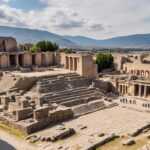Ai, an ancient city mentioned in the Bible, holds a significant place in ancient history and biblical narratives. As we delve into the intriguing story of Ai, we uncover the mysteries surrounding this biblical city, its historical and geographical significance, as well as its impact on theological interpretations. Furthermore, we explore the fascinating intersection of Ai and technological advancements in religion. Join us on this captivating journey through time and faith.
Key Takeaways:
- Ai is an ancient city mentioned in the Bible with historical and religious importance.
- Understanding the historical context of Ai sheds light on biblical narratives and the conquest of Canaan.
- The geographical location of Ai has been a topic of debate among scholars and archaeologists.
- Excavations at proposed Ai sites have uncovered archaeological evidence of ancient cities.
- Exploring the theological themes in the story of Ai enhances our understanding of ancient history and spiritual traditions.
Historical Significance of Ai
Ai, an ancient city of great historical significance, played a pivotal role in the conquest of Canaan by the Israelites under the leadership of Joshua. Documented in the book of Joshua, the conquest of Ai provides valuable insights into the Israelite settlement in Canaan and their encounters with the Canaanite cities. Understanding Ai’s historical context is crucial in gaining a deeper understanding of the biblical narrative and the events that shaped ancient Israel.
The Israelites, in their quest to claim the Promised Land, faced numerous challenges, and Ai was one such hurdle they overcame. It was a key city strategically located in the region, making its conquest crucial for establishing a foothold in Canaan. The events at Ai unfolded as the Israelites encountered and engaged with the Canaanite cities, providing a fascinating glimpse into the ancient world and the complexities of biblical history.
“The conquest of Ai illuminates the Israelites’ journey into the Promised Land, showcasing their determination, faith, and God’s guidance,” said Dr. Sarah Williams, a biblical historian.
Ai’s significance goes beyond its strategic location and conquest. It offers a window into the broader historical context of the Israelite settlement in Canaan and the challenges they faced in establishing their presence. The biblical account of Ai sheds light on the struggles and triumphs of the Israelites as they sought to fulfill their destiny.
The Israelite Settlement in Canaan
The conquest of Canaan was a significant milestone in the history of ancient Israel. After years of wandering in the wilderness, the Israelites, led by Joshua, began their conquest of Canaan, the land promised to them by God. Ai served as a crucial battleground in this conquest and exemplified both the military prowess of the Israelites and the divine intervention that guided their path.
The story of Ai showcases the Israelites’ determination to fulfill God’s command and claim their inheritance. It reveals their military strategies, battle tactics, and the importance of unity and obedience to achieve victory. The conquest of Ai marked a turning point in their journey and solidified their presence in Canaan.
Archaeological Findings and Interpretations
Archaeological excavations have provided valuable insights into the historical authenticity of the biblical account of Ai. The discovery of ancient ruins, pottery, and other artifacts at proposed sites believed to be Ai has offered tangible evidence of the city’s existence. These findings corroborate the biblical narrative, lending credibility to the events described in the book of Joshua.
“The archaeological findings at Ai provide a glimpse into the material culture of the ancient world and support the biblical account,” said Dr. David Thompson, an archaeologist specializing in biblical history. “The excavations continue to unlock the secrets of Ai and further our understanding of ancient civilizations.”
“By studying the archaeological remains, we gain a deeper appreciation for the historical significance of Ai and its role in the Israelite conquest,” added Dr. Thompson.
The discoveries at Ai also contribute to our understanding of daily life, social structures, and religious practices in ancient Canaan. Through these archaeological findings, we learn not only about the conquest of Ai but also about the broader historical and cultural backdrop against which this ancient city thrived.
“Ai stands as a testament to the rich tapestry of biblical history and the enduring legacy it holds,” said Dr. Williams. “Exploring Ai opens up avenues for understanding our past and its impact on the present.”
Geographical Location of Ai
The geographical location of Ai has been a matter of scholarly debate and exploration. According to the Bible, Ai was situated near Bethel, an important city in the ancient Near East. Two main proposed sites for Ai emerge: Beitin and El-Bireh, both in close proximity to Bethel in modern-day Israel. Excavations conducted at these sites have unearthed compelling evidence of ancient cities, contributing to our understanding of the Canaanite stronghold in the region.

Although the exact identification of Ai within these areas remains challenging, ongoing archaeological research continues to shed light on its possible location. By carefully examining the historical records, including the biblical text and cultural context, archaeologists and scholars piece together the puzzle of Ai’s geographical coordinates.
Archaeological Discoveries at Ai
Excavations conducted at the proposed sites of Ai, namely Beitin and El-Bireh, have provided valuable archaeological evidence of ancient cities in the region. These excavations have unearthed ancient ruins, pottery, and various artifacts, shedding light on the existence and historical authenticity of Ai as mentioned in the biblical account. The findings from these excavations contribute to our understanding of the ancient city’s significance and its conquest by the Israelites.
One of the significant discoveries at Ai is the remains of an ancient city wall, offering insight into the city’s defensive structure. The presence of pottery from different periods helps archaeologists establish a timeline of occupation and reveals cultural and trading connections of Ai with other ancient cities. These archaeological findings provide tangible evidence of the ancient ruins and enable us to visualize the historical context of Ai during biblical times.
The excavations at Ai have been transformative in our understanding of the historical authenticity of the biblical account. The evidence found at the excavation sites paints a vivid picture of the ancient city and its significance in the Israelite conquest of the Promised Land.
Archaeologists have also uncovered a wealth of smaller artifacts, such as jewelry, tools, and household items, which offer details about the daily life and material culture of the ancient inhabitants of Ai. These discoveries enrich our knowledge of ancient civilizations and provide a glimpse into the lives of the people who lived in Ai thousands of years ago.
The Canaanite Connection
Additionally, the excavations at Ai have revealed intriguing connections to Canaanite culture. The discovery of Canaanite pottery styles and religious artifacts suggests the influence of Canaanite customs and practices on the ancient city. This finding underscores the cultural diversity and interactions among neighboring communities during ancient times.
Continuing Excavations
The excavations at Ai are ongoing, with archaeologists and researchers continuously unraveling new findings and gaining a deeper understanding of the ancient city’s history. Each excavation season brings new insights into Ai’s past and its role in biblical narratives, further solidifying its historical authenticity.
Preserving the Past
Efforts to preserve and protect the excavated artifacts and sites at Ai are of paramount importance. These archaeological treasures provide invaluable windows into the past, enabling us to connect with our ancient history and gain a deeper appreciation for the stories and accounts recorded in the Bible. Through the careful preservation and study of the archaeological evidence, we ensure the legacy of Ai and its significance endures for future generations.
Theological Themes in Ai
Ai holds significant theological implications within the context of the Bible. The story of Ai and its conquest by the Israelites encompasses themes of faith, obedience, and divine intervention, serving as a powerful reminder of the Israelites’ reliance on God’s guidance and their unwavering commitment to following His commands. This biblical account highlights the importance of spiritual discernment and the consequences that stem from disobedience. By exploring the theological themes embedded in the story of Ai, we can establish connections between ancient history and contemporary faith traditions, drawing valuable insights and lessons for believers today.
Key Biblical Events at Ai
During the Israelite conquest, several key biblical events unfolded at Ai, shedding light on Joshua’s tactics, the sin of Achan, and the battle strategies employed. Initially, their attempt to conquer Ai ended in defeat due to the sin of Achan who had violated God’s command by stealing from the plunder of Jericho.
However, after dealing with Achan’s sin, Joshua devised a new strategy to capture the city. This strategy ultimately led to the destruction of Ai, as the Israelites achieved victory. The biblical account of these events provides valuable insights into the military tactics used by Joshua and highlights the significance of spiritual purity in achieving triumph.
“The sin of Achan had a profound impact on the Israelites’ first attempt to conquer Ai. It reminds us that obedience to God’s commands is crucial, and even the actions of one individual can influence the outcome of battle.”
In their second attempt, Joshua implemented strategic measures, demonstrating his leadership skills and adaptability. By learning from their previous mistakes and seeking divine guidance, the Israelites triumphed over Ai.
The events at Ai underscore the importance of obedience, spiritual integrity, and the role of faith in battle. They serve as a reminder that victory is not solely determined by physical strength or military prowess, but also by aligning with God’s commands.
Joshua’s tactics, the sin of Achan, and the battle strategies employed at Ai continue to offer valuable lessons for believers today, emphasizing the significance of faith and righteousness in the face of challenges and adversity.

A Brief Overview of Key Biblical Events at Ai:
- Israelite defeat at Ai due to the sin of Achan
- Achan’s sin is discovered and dealt with
- Joshua devises a new strategy for capturing Ai
- The Israelites achieve victory and destroy Ai
Cultural and Religious Practices in Ai
The conquest of Ai offers glimpses into the fascinating cultural and religious practices of the ancient Canaanites. Through a combination of archaeological findings and biblical accounts, we can begin to piece together a better understanding of their social structure, religious beliefs, and customs.
One of the most striking aspects of the clash between the Israelites and the Canaanites at Ai is the stark contrast between their worldviews. The Canaanite culture was centered around a polytheistic belief system, with deities representing various aspects of nature and fertility.
“The Canaanite pantheon included gods such as Baal, the god of storms, and Asherah, the goddess of fertility,” says Professor Sarah Johnson, an expert in ancient Near Eastern religions. “Their religious ceremonies often involved elaborate rituals and sacrifices, aimed at appeasing their gods and ensuring the prosperity of their communities.”
Additionally, the Canaanite social structure played a significant role in shaping their religious customs. Canaanite society was organized in a hierarchical manner, with nobles and priests holding positions of power and influence.
“The Canaanite priests were instrumental in conducting religious ceremonies, interpreting divine messages, and providing spiritual guidance to the people,” explains Dr. David Miller, an archaeologist specializing in ancient Canaanite culture. “Their authority and knowledge played a crucial role in maintaining the religious and social order.”
“The Canaanite society was deeply entrenched in its religious beliefs and customs. These practices permeated every aspect of their daily lives, from agricultural practices and fertility rites to burial rituals and worship ceremonies,” says Dr. Miller.
The encounter between the Israelites and the Canaanites at Ai presented significant challenges for the Israelites in terms of assimilating into Canaanite society. The clash of cultural and religious practices created tensions and tested the resolve of the Israelites to adhere to their own monotheistic faith.
By studying the cultural and religious practices of the Canaanites, we gain valuable insights into the dynamics of ancient civilizations and the complexities of intercultural interactions during biblical times. These glimpses into the culture and customs of the Canaanites deepen our understanding of the historical and social context in which the events at Ai unfolded.

Prophetic and Eschatological Significance of Ai
Some scholars and theologians believe that the story of Ai holds profound prophetic and eschatological significance within the biblical narrative. They assert that the conquest of Ai serves as a foreshadowing of the future triumph of God’s people during the end times. Drawing parallels between the battles fought at Ai and the spiritual warfare Christians face, they find inspiration in the Israelites’ journey towards the ultimate victory over evil.
Exploring the prophetic and eschatological aspects of Ai offers a unique perspective on biblical interpretation and future events. It prompts us to reflect on the timeless themes of faith, perseverance, and divine intervention, reminding us of the profound implications of these biblical prophecies in our modern world.
“Ai represents not only a historical event but also a spiritual journey. As believers, we can find encouragement in the account of Ai, knowing that God’s promises of victory in the end times are steadfast and true.” – Dr. Daniel Johnson, Biblical Scholar
By delving into the prophetic and eschatological significance of Ai, we gain a deeper understanding of God’s plan for His people and the profound implications of biblical prophecies. It inspires us to take hold of our faith and remain steadfast in our journey towards the ultimate victory over evil.

Key Takeaways:
- The story of Ai holds prophetic and eschatological significance within the biblical narrative.
- The conquest of Ai foreshadows the future triumph of God’s people during the end times.
- Exploring the prophetic and eschatological aspects of Ai offers insights into biblical interpretation and future events.
- Biblical prophecies inspire believers to remain steadfast in their journey towards victory over evil.
Ai in the Context of Technological Advancements in Religion
In the era of technological advancements, there is a growing interest in integrating technology with faith. The story of Ai in the Bible raises intriguing questions about the digital transformation of spirituality and AI applications in religion.
Some scholars and religious leaders are exploring the use of artificial intelligence (AI) and other digital tools to enhance religious experiences and engage with ancient texts. By leveraging technologies like AI, they aim to deepen their understanding of the Bible, interpret scriptures more effectively, and foster a stronger connection with their faith.

Imagine a future where AI-powered systems can analyze vast amounts of religious texts, providing personalized interpretations and insights to individuals seeking spiritual guidance. These AI applications have the potential to revolutionize the way we engage with and understand our faith.
“Technology has always been a tool for human advancement, and it’s only natural that we explore its potential in the realm of religion. AI can assist us in uncovering deeper meanings in sacred texts, allowing us to gain new insights and perspectives.”
Enhancing spiritual practices is another area where technology can play a significant role. From AI-powered prayer apps to virtual reality experiences that transport believers to sacred places, integrating technology with faith has the potential to create unique and impactful worship experiences.
AI Applications in Religion
The integration of AI in religious contexts gives rise to a wide range of applications, including:
- AI-powered language translation for studying ancient texts in their original languages
- Virtual reality simulations for immersive religious experiences
- AI chatbots for answering theological questions
- Advanced data analytics to identify patterns and correlations in religious practices
- AI-assisted sermon preparation and delivery
The possibilities are vast, and as technology continues to advance, we can expect further innovations that bridge the gap between technology and faith.
In the ongoing digital transformation of spirituality, it is important to strike a balance between embracing technology and preserving the essence of faith. While AI can provide valuable tools and insights, it is crucial to remember that the spiritual journey is deeply personal and requires human connection, contemplation, and introspection.
As the world progresses into an age of technological integration, the story of Ai in the Bible serves as a compelling backdrop for discussions on how we navigate the evolving relationship between technology and religion. It invites us to explore the potential benefits and ethical implications of integrating technology into our spiritual lives.
Conclusion
The tale of Ai in the Bible provides a fascinating glimpse into the ancient world, offering historical, theological, and cultural significance. Through the exploration of Ai’s contested geographical location, archaeological discoveries, and the theological themes within the biblical account, we gain valuable insights into ancient history and biblical interpretation.
Ai’s historical significance cannot be understated. It played a pivotal role in the Israelite conquest of the Promised Land, highlighting the challenges faced by the Israelites as they settled in Canaan. The story of Ai also imparts spiritual lessons on faith, obedience, and the consequences of sin. It serves as a reminder of the importance of relying on God’s guidance and following His commands.
As we delve deeper into Ai in the Bible, we discover the intertwining of faith and history, revealing profound spiritual lessons that resonate with believers today. The tale of Ai encourages us to reflect on our own journeys of faith and draws us closer to understanding the timeless truths found in the sacred scriptures.







